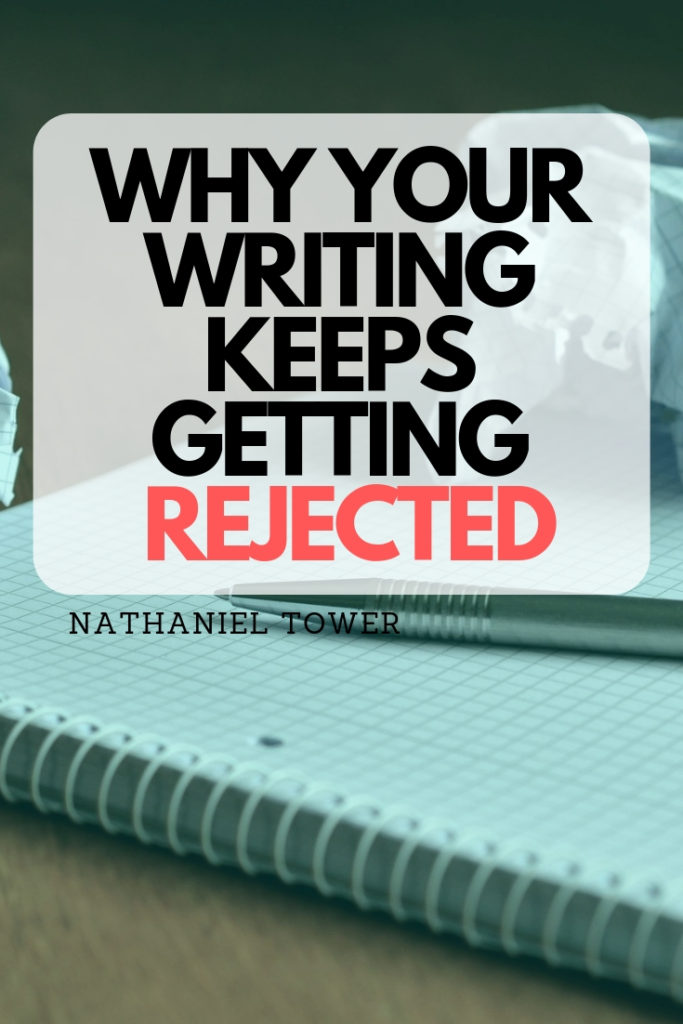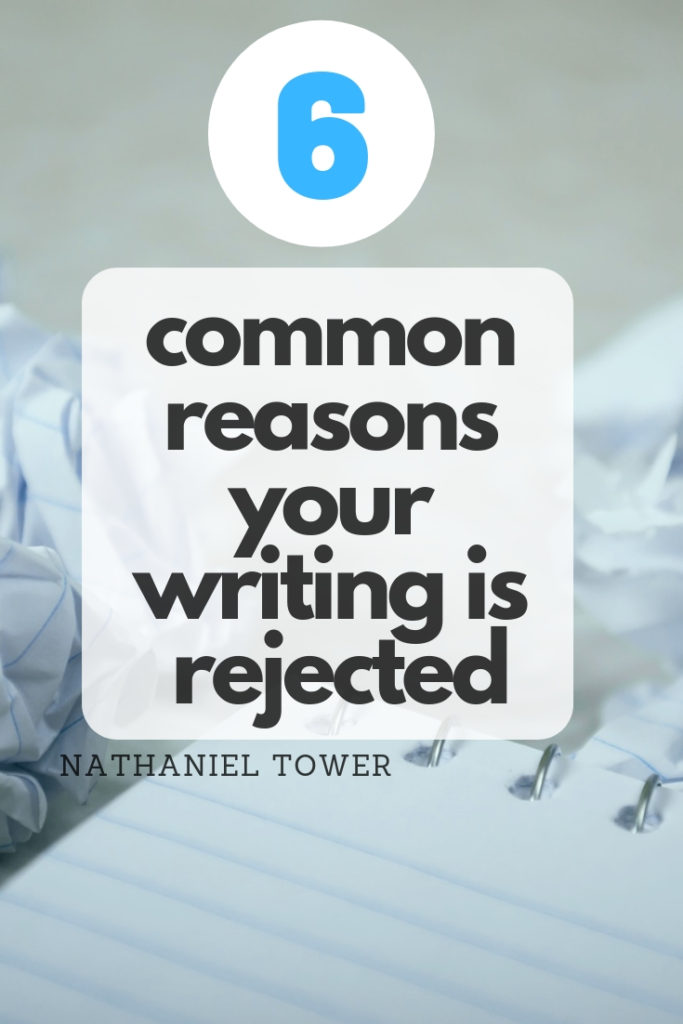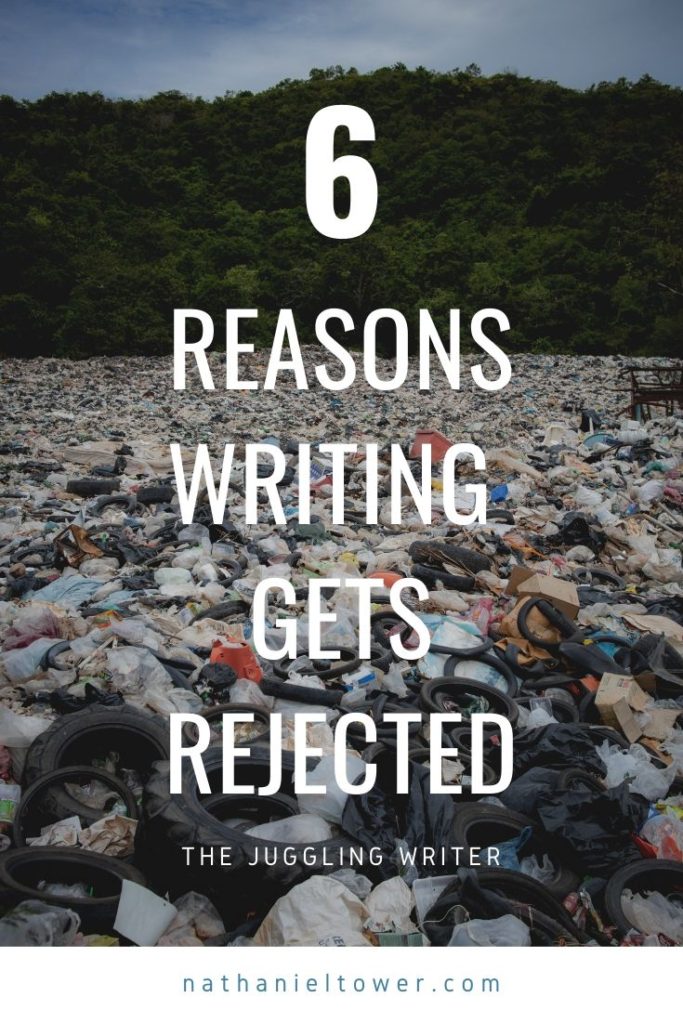Last Updated on July 12, 2020 by Nathaniel Tower
If you are a writer, you have been rejected. It’s a simple fact of life. No writer in the world has ever been accepted every time. Even the best writers in the world are rejected more often than they are accepted.
But no matter how many times you’ve been rejected, it still stings every time. The rejection letter always makes you wonder, why was my writing rejected?
It makes sense to be uncertain or discouraged by rejection. After all, you presumably sent out something you thought was really good. You expected it to be accepted and published. Otherwise, you wouldn’t have wasted your time sending it out.
I’ve written a number of articles about rejection. From explaining what rejection letters mean to exploring what you should do after being rejected, you could say I’m somewhat of a seasoned expert on the subject. On a personal level, I’ve had my writing rejected hundreds of times. On the flipside, I’ve rejected thousands of stories during my 8-year tenure as Managing Editor at Bartleby Snopes.
So let’s see if we can get to the bottom of this. Why the hell was your last piece of writing rejected? Here are the most likely explanations and how you can figure out the answer.

Look at the rejection letter first
The best place to look for reason after a rejection is in the rejection letter itself. Sometimes, the editor will give you a very clear indication of why your writing wasn’t published. More often, you’ll get a form rejection letter that offers no clarity whatsoever. Occasionally, the rejection will offer some half-truths or falsely encouraging language to soften the blow of rejection.
No matter what the rejection letter says, it’s important to remember this: rejection is just the opinion of one editor. Regardless of the reason (or lack thereof), there are thousands of other opportunities to get that same piece of writing published. Naturally, you might want to consider any advice the editor gives you in the rejection, but you should never give up on a piece just because of a rejection.
For more information about how to interpret a rejection letter, refer to this post. For now, let’s move on to the real reason your writing was rejected.
You didn’t follow the guidelines
This might not be the most common reason for rejection, but it is certainly the easiest thing to identify and fix. Publications have guidelines. If you don’t follow them, you will be rejected. Here are some of the top ignored guidelines that read to instantaneous rejection:
- Improper manuscript format. Some publications have very specific formatting requirements. Follow all of them no matter how silly they may seem. When in doubt use this short story template.
- Going over (or under) the word count. Seriously. If you are one word over, you could be rejected.
- Sending the wrong type of file. If they want RTF, don’t send DOC or DOCX. If they ask you to paste it in the body of the email, don’t send an attachment. Just follow the guidelines.
- Putting your name or contact information on the submission. In most cases, you should include your name and contact info on your submission. However, some publications read blind and request you leave this off. If you put it on, they will reject you.
So how do you know if you violated the guidelines? In many cases, they will probably tell you. In other cases, you’ll get a swift rejection with no explanation. When this happens, it doesn’t hurt to take a minute or two to go back and read their guidelines again to see if you did anything wrong.
If you did screw up the guidelines, don’t fix it and send your piece again unless they specifically request it. They’ll just find you annoying at that point.
Your writing didn’t grab them immediately
Publications get thousands of submissions a year. Some of them get thousands of submissions a week. If you think they read every word of every submission, then I have a few dozen bridges to sell you. The vast majority of submissions are rejected before the editor has finished reading the first page. There just isn’t enough time to read every story or poem that comes in. If your opening is weak or your writing is boring, cliched, or otherwise unengaging, you don’t stand much of a chance. You have to start strong. And finish strong. And probably be pretty damn strong in the middle as well.
Unfortunately, there is no way to know if an editor read your entire story or decided to reject it after two sentences. I’ve never received a rejection letter telling me they couldn’t get past the first page. But you should be able to tell if your writing isn’t worth reading. Just try reading it yourself. If you find yourself struggling to get to the end, then it’s unlikely anyone is going to want to publish it.
You submitted something they’ve seen before
I don’t mean this in the purely literal sense, although you will probably be rejected if you resubmit the exact same story that’s already been rejected. What I mean here is your story or poem is a tired old topic they’ve read hundreds of times before. Like a struggling writer talking to someone in a bar. Or another zombie story. If you want to get published, you have to submit something unique. As mentioned before, editors have to read through thousands of submissions. They want something new.
You had typos in your manuscript
Duh. Don’t ever send a manuscript with typos.
You’re experimenting for the sake of experimenting
It’s great to take risks as a writer. But do you have reasons for taking those risks? If you are mindlessly doing things like leaving out quotation marks in your dialogue or using unique formatting that doesn’t have any literary impact, then a confused or frustrated editor is going to toss your work in the reject pile.
Your writing just isn’t very good
Maybe your idea was great and had a clever structure or ingenious plot that was super engaging and kept the editor on the edge of his or her seat. Unfortunately, the story isn’t going to sell itself if it isn’t supported by great writing. Maybe your sentence structure is sloppy, your pacing is off, your word choice is dull, etc. Fortunately, you can almost always fix this by putting a lot more time and effort into a piece.
It just wasn’t a good fit for that publication
This is by far the most common reason for rejection. The story you sent was probably pretty good and worthy of publication somewhere. However, you just sent it to the wrong venue. This is sometimes obvious, like you sent an erotic horror piece to a children’s magazine. Or a straightforward detective genre story to a highly experimental magazine. Most of the time, it’s more about the subtle aesthetics of the writing style. You have to read what they publish before you send your work. If you ever send a piece to a publication without reading their work, then just assume you are getting rejected because it’s simply not the right style for them.
Final thoughts
99% of all rejections will fall into one of the buckets above. In my personal experience, about half of what’s rejected can be published elsewhere without any major edits. The other half will need more significant work before you send it out again. Unfortunately, the only way to figure this out is to keep sending out your work and keep making it better.
The bottom line is this: if you want to be published, you need to:
- Follow submission guidelines
- Read a publication before submitting
- Send out your best work
If you do all that and you still get rejected, then maybe the world is just out to get you.
Why have you been rejected in the past? Share your experiences in the comments. And don’t forget to share this post on all your favorite platforms.



I seem to be successful with independent mags., and rejected by the university backed mags. Think student editors are concerned with structure, meter, and layout
That’s an interesting observation and probably very accurate. The university publications often seem to be looking for something that fits into a more traditional literary box. They don’t take as many risks. Thank you for sharing your perspective!
I really appreciate your insight. I am trying to be more focused in my submissions and really read the publication before submitting but still getting rejections. I think the key is to just keep at it and keep refining my submissions..oh and stay positive. That’s a tough one! Thanks for your information.
My poetry and prose always get rave comments when I post them online, but I have received nothing but rejection from literary magazines.
When I enter contests, I always read the winning submissions of previous years. I’m often not impressed by them. I usually think my writing is better.